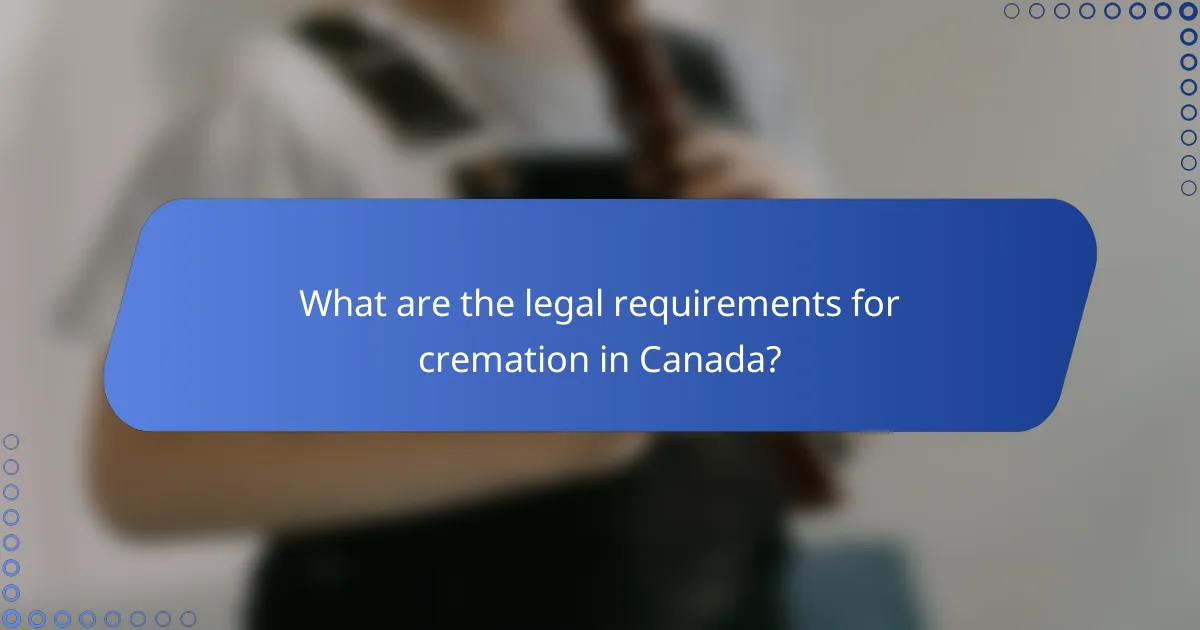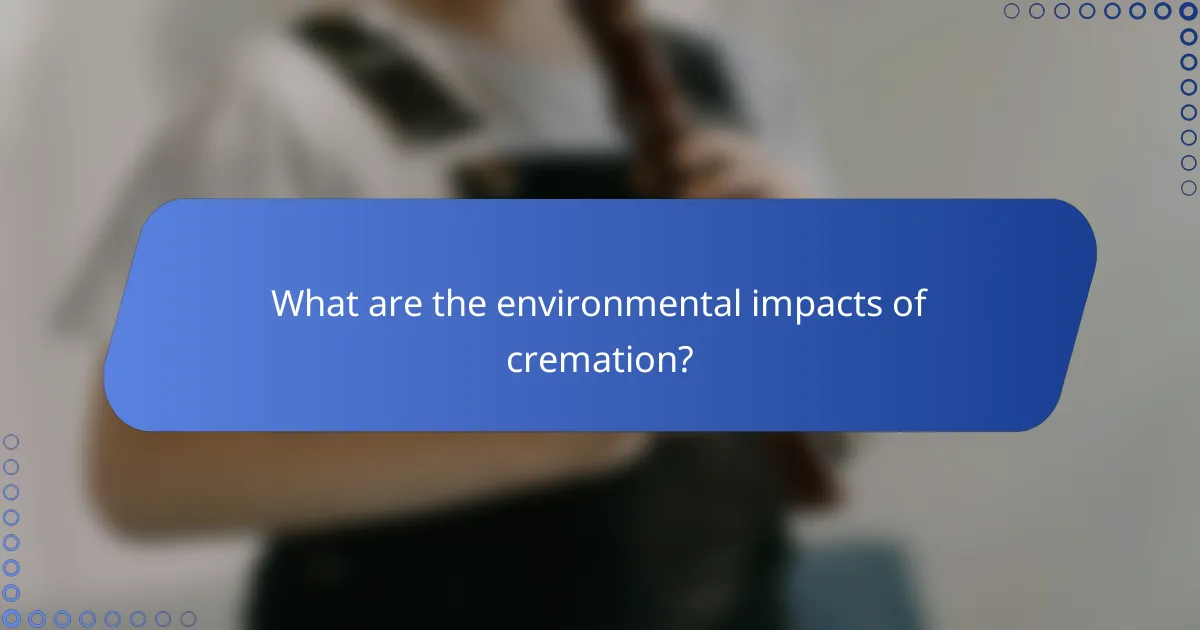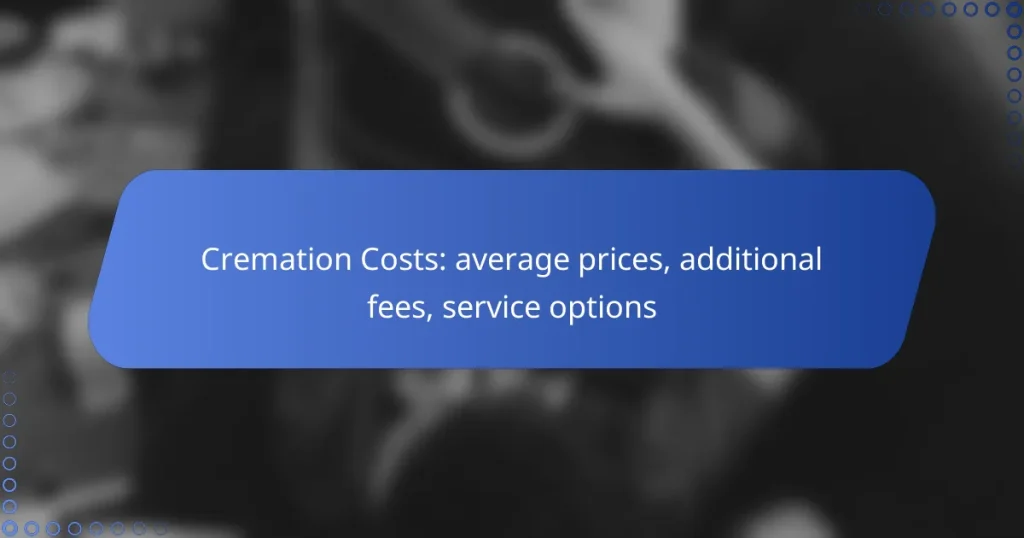Cremation costs in Canada typically range from CAD 1,000 to CAD 3,000, influenced by the type of service and additional options selected. It’s important to consider potential extra fees, such as transportation and documentation, which can affect the total expense. Various service options, including direct cremation and memorial services, are available to accommodate different preferences and budgets.

What are the average cremation costs in Canada?
The average cremation costs in Canada typically range from CAD 1,000 to CAD 3,000, depending on the type of service and additional options selected. Direct cremation is generally less expensive than full-service cremation, which includes more comprehensive arrangements.
Average direct cremation cost
The average cost for direct cremation in Canada is usually between CAD 1,000 and CAD 2,500. This option involves minimal services, often including only the cremation itself and basic paperwork, without a formal ceremony.
Choosing direct cremation can be a cost-effective solution for families seeking a simple and straightforward process. It is advisable to compare prices from different providers, as fees can vary significantly.
Average full-service cremation cost
Full-service cremation typically ranges from CAD 2,500 to CAD 4,000. This option often includes a memorial service, transportation, and the use of facilities for viewing or gathering.
Families opting for full-service cremation should consider what specific services are included in the package, as additional fees may apply for items like urns, flowers, or catering. Understanding these costs upfront can help avoid unexpected expenses.
Regional price variations
Cremation costs can vary widely across different provinces and cities in Canada. For instance, urban areas like Toronto and Vancouver may have higher prices compared to rural regions.
It is beneficial to research local providers and compare their offerings. Some provinces may also have specific regulations affecting cremation services, which can influence overall costs.

What additional fees should I expect?
When planning for cremation, it’s essential to consider various additional fees that may arise beyond the basic service costs. These fees can include charges for transportation, containers, and necessary documentation, which can significantly impact the overall expense.
Transportation fees
Transportation fees cover the costs associated with moving the deceased from the place of death to the crematory. This can vary based on distance and the specific funeral home policies, typically ranging from a few hundred to over a thousand dollars.
When selecting a service provider, inquire about their transportation policies and any associated costs. Some providers may include this fee in their overall package, while others may charge it separately.
Container costs
Container costs refer to the price of the cremation container or urn used during the cremation process. Basic containers can start at low prices, while more elaborate urns can range from moderate to high costs, depending on materials and craftsmanship.
It’s advisable to compare options and choose a container that fits your budget and preferences. Many funeral homes offer a variety of choices, so you can select one that meets both your needs and financial considerations.
Death certificate fees
Death certificate fees are charges for obtaining the official document that certifies the death. These fees can vary by state or country, typically costing between $10 to $50 per copy, and you may need multiple copies for various legal purposes.
Check with your local vital records office for specific pricing and requirements. It’s often wise to order several copies at once to avoid repeated fees later on, especially if you need them for settling estates or insurance claims.

What service options are available for cremation?
There are several service options available for cremation, each catering to different preferences and needs. These options include direct cremation, memorial services, and scattering services, allowing families to choose what best fits their situation and budget.
Direct cremation services
Direct cremation services involve the immediate cremation of the deceased without a formal viewing or service beforehand. This option is often the most cost-effective, typically ranging from a few hundred to a couple of thousand dollars, depending on the provider and location.
When selecting direct cremation, consider the included services, such as transportation, necessary permits, and the cremation itself. Some providers may offer additional options, like urn selection, which can affect the overall cost.
Memorial services
Memorial services provide an opportunity for family and friends to gather and celebrate the life of the deceased, often held after the cremation. These services can be customized to fit personal preferences and may include elements like music, speeches, and displays of photographs.
The cost of memorial services can vary widely, typically ranging from a few hundred to several thousand dollars, depending on the venue, number of attendees, and any additional services requested. It’s essential to plan ahead and budget for these expenses to ensure a meaningful tribute.
Scattering services
Scattering services involve the dispersal of cremated remains in a meaningful location, such as a favorite park, beach, or garden. Many families choose this option to honor the deceased’s wishes or to create a lasting memory in a special place.
Costs for scattering services can vary based on location and any permits required, generally falling within a few hundred dollars. Some providers offer guided scattering services, which may include a ceremony, while others may allow families to handle the scattering independently. Always check local regulations regarding scattering to ensure compliance.

How do I choose a cremation provider in Canada?
Choosing a cremation provider in Canada involves evaluating services, costs, and the reputation of the provider. It’s essential to compare options and understand what each provider offers to ensure you select one that meets your needs and budget.
Factors to consider
When selecting a cremation provider, consider the range of services offered, including direct cremation, memorial services, and any additional options like urn selection or transportation. Pricing can vary significantly, so it’s wise to obtain quotes from multiple providers to compare costs effectively.
Additionally, look into the provider’s reputation by checking online reviews and asking for recommendations from friends or family. Ensure that the provider complies with local regulations and is licensed, as this can impact the quality of service you receive.
Questions to ask providers
Before making a decision, ask potential cremation providers about their pricing structure, including any hidden fees for services like paperwork or transportation. Inquire about the timeline for cremation and whether there are options for viewing or memorial services.
It’s also beneficial to ask about the types of urns available and whether they offer personalized options. Understanding their policies on remains storage and retrieval can help you make an informed choice that aligns with your preferences and needs.

What are the legal requirements for cremation in Canada?
In Canada, legal requirements for cremation include obtaining necessary documentation and adhering to specific waiting periods. Each province may have its own regulations, so it’s essential to check local laws for compliance.
Necessary documentation
To proceed with cremation in Canada, you typically need a death certificate and a cremation authorization form. The death certificate must be signed by a qualified medical professional, while the authorization form is usually provided by the funeral home or cremation service.
Some provinces may require additional documents, such as a permit for cremation. It’s advisable to consult with the funeral service provider to ensure all paperwork is complete and meets local regulations.
Waiting periods
Waiting periods for cremation in Canada can vary by province but generally range from 24 to 48 hours after death. This period allows for any necessary legal or medical reviews to take place before the cremation process begins.
In some cases, if an autopsy is required, the waiting period may be extended. Always confirm the specific waiting period with your local authorities or funeral service provider to avoid delays.

What are the environmental impacts of cremation?
Cremation has various environmental impacts, primarily related to energy consumption and emissions. While it is often viewed as a more eco-friendly option compared to traditional burial, it still contributes to carbon emissions and other pollutants.
Carbon footprint considerations
The carbon footprint of cremation can vary based on the type of cremation equipment used and the energy sources powering it. Traditional cremation typically emits several hundred kilograms of CO2 per body, depending on the efficiency of the crematory. Additionally, emissions of mercury and other pollutants can occur if dental amalgams are present.
To mitigate these impacts, some crematories are adopting more energy-efficient technologies and using renewable energy sources. Choosing a crematory that prioritizes environmental sustainability can help reduce the overall carbon footprint associated with cremation.
Alternative eco-friendly options
For those seeking greener alternatives to traditional cremation, options like water cremation (alkaline hydrolysis) and natural burial are available. Water cremation uses significantly less energy and produces fewer emissions, making it a more environmentally friendly choice.
Natural burial involves interring the body in a biodegradable casket or shroud without embalming chemicals, allowing for natural decomposition. This method not only reduces carbon emissions but also promotes the preservation of green spaces. Exploring these alternatives can provide a more sustainable way to honor loved ones while minimizing environmental impact.


